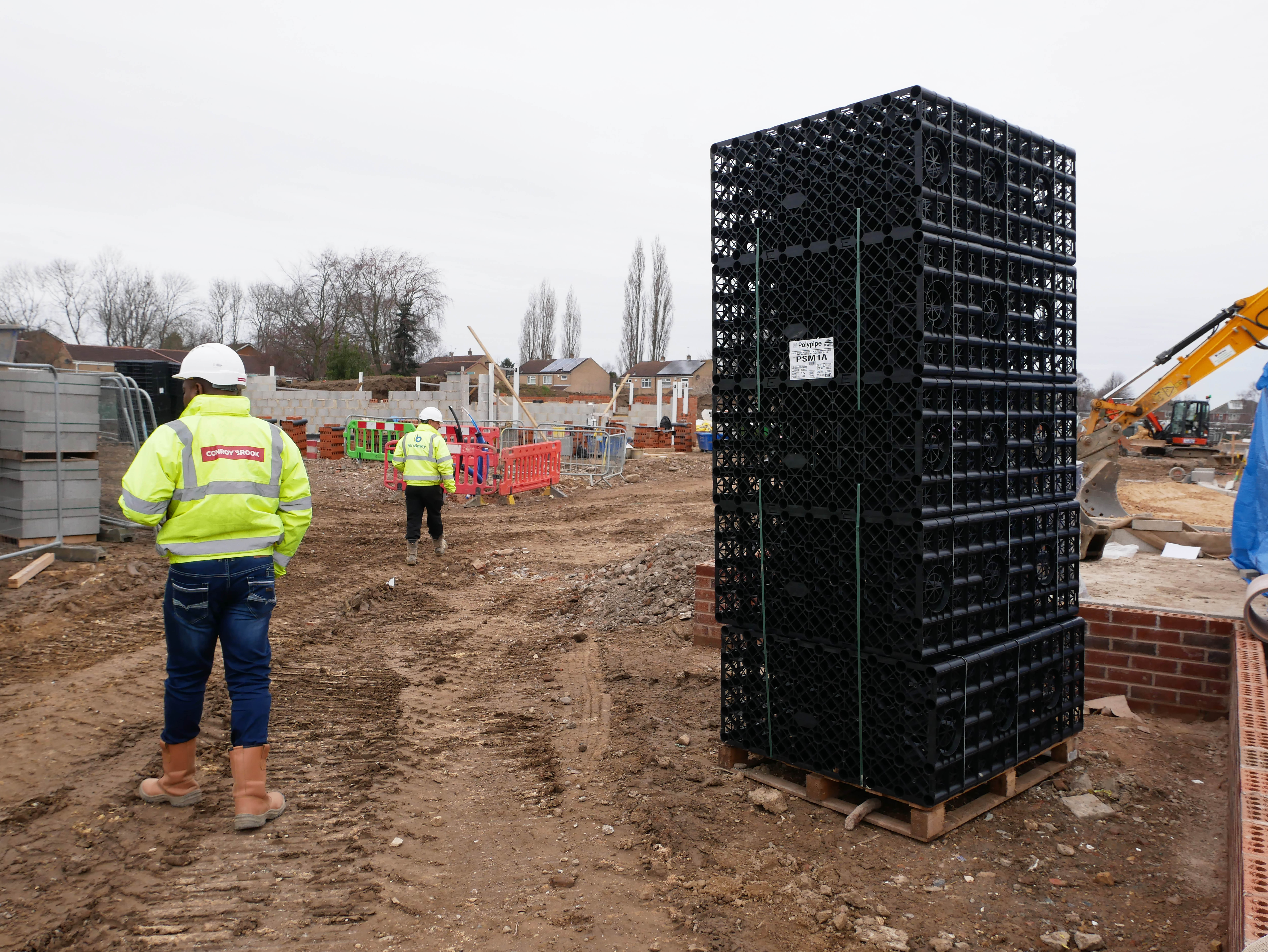Sustainable Drainage Solutions: Building Community Resilience
Tuesday 23rd April 2024

- By Richard Eddy, Category Manager of Underground and Utilities at Polypipe Building Products.
The UK’s sewerage infrastructure is increasingly challenged by climate change, leading to more frequent and severe urban flooding. Despite the benefits of sustainable drainage systems (SuDS) for managing rainfall and reducing sewer pressure, their adoption in new housing developments remains slow, even following Ofwat’s Code for Adoption guidance in 2021.
SuDS can have a major impact on the health and resilience of communities; therefore, understanding the key considerations for limiting the environmental impact of housing developments through effective drainage is critical if we are to work towards a more sustainable, flood-resilient future.
Building resilient communities
Sustainable drainage systems are at the forefront of the battle against urban flooding, offering a practical and eco-friendly solution to manage rainfall and mitigate flood risks. SuDS work by mimicking natural processes, allowing water to be absorbed back into the ground, stored or slowly released back into watercourses, reducing the strain on our conventional sewer systems.
SuDS also play an important role in improving water quality, enhancing biodiversity, and creating more attractive and healthier living environments. In an era where environmental sustainability is not just a preference but a necessity, the adoption of SuDS represents a significant step forward in building resilient communities and preserving our natural resources.
However, despite their advantages, the uptake of SuDS in the UK has been slow. This reluctance is often due to a mix of regulatory, practical and educational barriers. Yet, with the looming enforcement of Schedule 3 of the Flood and Water Management Act 2010 in England, it’s more important than ever for merchants, housebuilders and specifiers to understand and integrate these systems into their projects.
Upskilling the industry
One of the primary challenges is understanding the complex regulatory landscape. The varying interpretations of SuDS requirements across different local authorities can lead to confusion. This inconsistency makes it difficult for the supply chain to adopt a one-size-fits-all approach as it requires bespoke solutions for different projects and regions.
There is also a significant knowledge and skills gap within the industry regarding SuDS design, implementation and maintenance. Many professionals are still more familiar with traditional drainage solutions and are not aware of the benefits that SuDS can offer.
The perceived and actual costs associated with SuDS implementation can also be a barrier. Initial outlays for the design, installation and long-term maintenance of SuDS can deter developers, especially if the financial benefits of reduced flood risk and environmental impact are not immediately apparent.
To tackle these challenges, a collaborative approach is needed, involving government bodies, the construction industry and SuDS experts. Knowledge sharing to empower merchants to share the benefits and practicalities of SuDS, simplifying regulatory processes, and encouraging innovation in SuDS solutions are all important steps forward.
A mandatory switch
The regulatory landscape for drainage in the UK is undergoing significant changes that will have implications for all housing developments. One of the key updates is the introduction of Schedule 3 of the Flood and Water Management Act 2010 in England, making the inclusion of SuDS mandatory in all new residential developments larger than 100m2. The move follows Wales, where similar regulations have been in place since 2019.
This change means that going forward, planning applications for relevant developments must include SuDS that comply with national standards for managing surface water. The aim is to encourage more sustainable water management practices, reduce flood risk, and enhance biodiversity and water quality in new developments. For merchants, this signifies the need to stay informed of the best practices in SuDS to help housebuilders select the right materials and systems in the planning and design stages of new projects, ensuring compliance with these regulations to avoid potential delays or objections.
Bespoke solutions
Implementing SuDS is not a one-size-fits-all approach. The unique characteristics of each development site play an important role in determining the most effective SuDS solutions. Factors such as soil type, topography and the existing water table level can significantly influence the selection, design and placement of SuDS features. For instance, permeable paving may be more suited to areas with absorbent soil types, whereas detention basins might be necessary for areas prone to higher rainfall levels.
Recognising and adapting to these site-specific conditions is essential for the successful implementation of SuDS, ensuring they are as effective and efficient as possible in managing surface water. To effectively adapt SuDS solutions to the specific conditions of each site, partnering with a manufacturer that offers design support is invaluable.
Looking ahead
With the UK’s ambitious housing targets, we have no choice but to overcome challenges in supporting this expansion while ensuring new developments comply with increasingly stringent regulations. Merchants, housebuilders and developers require support, encompassing guidance on the regulatory landscape, education and training on SuDS design and maintenance, and a push towards innovative drainage solutions.
Building strong partnerships among housebuilders, local authorities and drainage experts is key to sharing best practices and overcoming the challenges associated with implementing SuDS. This collaborative approach not only supports sustainable development but is also crucial for building community resilience. As we face the increasing challenges of climate change, our commitment to sustainable drainage systems becomes more than a regulatory compliance issue – it’s a vital component of creating healthy, resilient communities.
By prioritising SuDS in our development projects, we’re investing in the long-term health and wellbeing of our communities, ensuring they can thrive in the face of environmental challenges.


